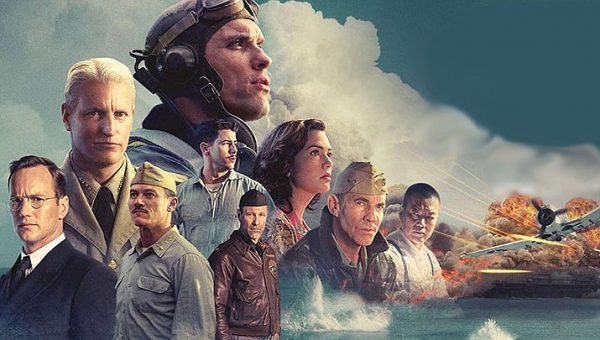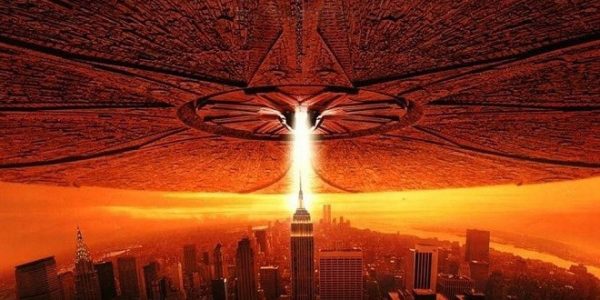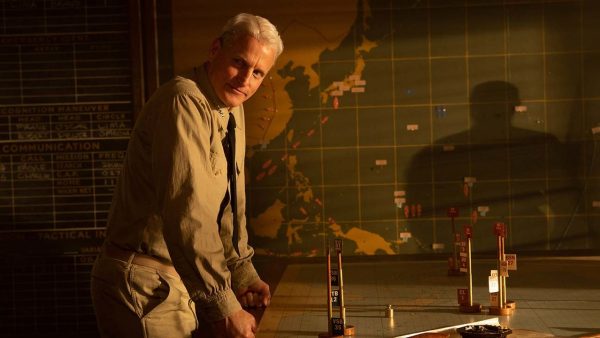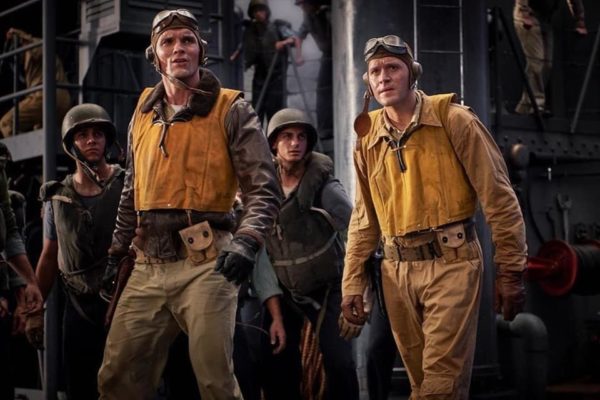Alex Moreland talks to Roland Emmerich about his new film Midway, his favourite movies of 2019, and more…

So, I know Midway was a passion project for you, and it took a long time to get it made. Could you tell us a little bit about the production process – where did this film start for you?
It all started maybe more than 20 years ago. I saw a documentary about Midway and I thought, “Wow, this is an interesting battle” – then I started reading some books and said, “Oh, my God. This would make a really, really interesting movie.” Then I went to Sony, who I had just signed a deal with, and they were also excited – until, not unsurprisingly, the owners of the studio, who were Japanese people, kind of baulked at making such an expensive movie where they lose the battle [Midway is the battle between the US and Japanese forces immediately following Pearl Harbour].
So, I was disappointed, but I already had another script, which was also a war story, called The Patriot. I moved on to that, but I never ever really lost the interest [in Midway]. Once I’m interested in something, I keep reading and reading and reading. Maybe five years ago, I met a young writer. We spoke, and every time I meet a young writer I’m asking, “what’s the movie that you really have to write?” He said without any hesitation, “Midway” – then I asked “Why?”
He said, “Well, my whole family is Navy. I think this would be a really, really interesting movie for me to write.” That’s how it started. We worked really long on the script and through many, many phases. Finally, I felt that it was right to do it, and then we made it.
Now, because Sony backed out, you had to finance the film independently – Midway is, I believe, the most expensive independent film ever made – how did that change your approach to the production, if at all?
Well, it affected the production quite a bit. First of all, you have to work faster. You cannot make it on long days [the same way] you make a studio film. I had a relatively short shooting period. It was 65 days, and there was no second unit. So, you have to be very planned and you have to know what you’re doing. But it all worked great.
The really cool thing is that there’s nobody who tells you anything – maybe sometimes your partner sees something, but most of the time, you only see them when the movie’s nearly finished, and then you go to testing period and they have their notes and stuff. It’s all very different from a studio, where you constantly have people trying to give you their opinion. It was actually so enjoyable that I decided to make my next movie, Moonfall, away from Universal and do it independently, because I loved [that process] so much.
You mentioned film studios there – do you think the film industry, as it stands now, is more risk averse than it was when you started?
Oh, absolutely. Kind of in a weird way, they’re all in a state of panic; with all the distractions of TV and video games and stuff, it becomes more and more difficult to lure people into the theatre. Actually, here in America, you have to spend enormous amounts of money, like thirty, forty, fifty million dollars to advertise the movie. That comes on top of escalating production costs. It becomes a real, real risky game. I understand they’re risk-averse, but I just always do what I want to do and try to get it done.

Do you think that aversion to risk can be tracked back to your own films in the 90s, as almost pioneers of the blockbusters that dominate today?
I see the influence of Independence Day in a lot of the Marvel movies. It’s always mainly an invasion, it’s always huge destruction, and there’s this slightly fun tone. I think that’s an extension of a lot of what I did. But then on the other hand, film is constantly evolving. Everybody is influenced by others. I’m influenced, I would say a lot influenced by Spielberg and Lucas and people like that. It’s just an ongoing changing industry – and now, with the streamers, there’s a whole other shift in what people want to see. For example, the streamer brought the rom-com back. Seems like it’ll stick!
On another note, World War Two films are quite a crowded genre – why did you think this story in particular was one worth telling?
Well, when I discovered it through a documentary, I thought, “Oh, my God, what a complicated, interesting battle,” because so many factors led into it. America had just gotten into the war, and was pretty much unprepared. The Japanese army was this super-powerful navy: they had better planes, bigger carriers and more equipment. On top of that, there was this thing going on with the Navy intelligence.
It was just interesting how this all evolved, how Nimitz managed to convince Washington to help assist people to say Midway is the big, new battle. There was a lot of ingenuity and luck on this battle, a lot going on, and that’s the interesting thing sometimes in these big global missions. Sometimes one single decision of one man can change the whole battle.

You were born in Germany, and you lived there up until your early adulthood – do you think it’s fair to say, though, that you make quite American movies? Like Independence Day, like The Patriot, like Midway, so on
As a young kid, all I watched was American movies. Then I came to film school. I was the odd one out, who never really wanted to make a German movie. I wanted to make American movies. It was just my thing. It was inevitable, probably, that I came to America. But I made three movies in Germany – they all looked pretty American. Ever since, for me, I’ve never changed the kind of movies I made. It’s different. I met a lot of other directors from Europe and they obviously had to change their movies, and I never had to. I’m actually happy about that.
You’ve said in another interview that you don’t think the films being made now are, generally, as good as the ones made ten, twenty, thirty years ago. So, on the flip side of that, I wanted to ask – are there are movies you’ve seen recently that you have particularly enjoyed?
Oh, I enjoyed quite a lot of movies this year! I enjoyed 1917 a lot; it was probably my favourite movie of the last four or five years. I enjoyed Joker, because it was a totally different form of superhero movie. It reminded me very much of Logan. And I loved, like everybody, Parasite, which was this great whiff of fresh air. So, I think this was a very, very good year. There were a lot of other movies which I liked too, but these three, I have to say, made my year.
Finally, then, what’s the most important thing you’d like someone to take away from watching Midway?
That they be reminded that some young men, of a very young age, risked their life for our freedom and democracy against fascism. That’s the core of the whole movie. And I think it’s quite good to remind people about that.
It’s certainly becoming quite relevant again, isn’t it?
Mm-hmm. Indeed, right-wing nationalists are a threat everywhere. We have here in America a more and more dictator kind of president. It’s quite… interesting.
Roland Emmerich, thank you very much!
Midway is available on digital download from March 2nd, and can be bought on DVD & Blu-Ray from March 9th.
Alex Moreland is a freelance writer and television critic; you can follow him on Twitter here, or check out his website here.












